Have you ever found these situations familiar?
- Someone searches for a nearby eye doctor after experiencing sudden blurry vision.
- Another is looking for a pediatrician for their child’s recurring fever.
- A third need a dentist open on weekends.
In each case, the first step is often the same: picking up a phone & searching online. 📱
This is how modern medical choices are made. Patients explore options, compare services, read reviews, and make quick decisions—often within minutes. The doctors & clinics that show up at the top in search results are more likely to earn trust and drive bookings.
That’s exactly what SEO for Doctors delivers: visibility, trust, and patient growth.
In this blog, you’ll discover how SEO strategies for doctors can bring more patients to your practice and boost your online visibility.
What is SEO for Doctors? (And Why It’s Not Like General SEO)
In today’s digital-first world, even a mild symptom sends people to Google before they ever see a doctor. 👨🏼⚕️
It usually starts with a quick Google search.
- “How to treat a sore throat at home,”
- “Best way to prevent tooth pain,”
- “Remedies for back pain.”
These searches don’t just lead to answers—they often land on blogs, videos, or FAQs, many published by individual doctors or specialty practices.
That’s the turning point: a remedy search turns into a provider discovery.
This is exactly what SEO for doctors does—it helps your medical practice/website or individual profile appear in those crucial search moments. Whether it’s an ENT specialist, a pediatrician, or a dentist, it helps your practice show up on page one when it matters most.
SEO for Doctors vs. General SEO
Unlike general SEO, where rankings often depend on product relevance or brand visibility, medical SEO, or SEO for doctors, is more about trust, accuracy, and patient intent.
SEO Element | SEO for Doctors | General SEO |
| What Truly Matters | Trust, accuracy, and patient intent | Product relevance or brand visibility |
| Content | Medically accurate, credible sources | Informative or promotional content |
| Ranking Factors | Focused on Authority & Trust | Quality content, backlinks, keywords |
| Compliance | Must follow HIPAA and avoid unverified claims | Fewer legal or compliance restrictions |
| Local Optimization | Crucial for finding nearby clinics and services | Local relevance varies by industry |
| User Intent | Patients seeking immediate, reliable answers | Users seeking products, info, or entertainment |
In short, SEO for doctors and medical practices is a mix of trust-building, compliance, and patient-focused strategy.
Of course, with higher standards come unique challenges. ⚠️
Let’s check out some SEO hurdles healthcare providers often face—and why overcoming them matters.
Gaps in SEO for Doctors – Why Doctors Struggle to Rank?
While most businesses are just trying to get clicks, healthcare providers or doctors are dealing with deeper concerns: patient trust, medical accuracy, legal compliance, and location-driven urgency. These real-world challenges can make or break your online presence.
🔻Let’s break them down with real-life scenarios:
Lack of Patient-First Content
A lot of healthcare websites just stick to an “About Us” section and a list of services. This cannot be enough for patients looking for terms like “remedies for migraines” or “how to cure ear pain.”
If your content doesn’t answer their real questions—or if it is copied from elsewhere—it won’t build trust or rank well. So, ensure focusing on original, helpful content that speaks directly to patient needs.
Weak Local Signals
When someone types “pediatrician near me,” it sparks a race—dozens of clinics competing to be the first choice.
Here, many healthcare professionals struggle with how to optimize their Google Business Profile and local keywords, often having outdated listings and few reviews, resulting in patients being lost to competitors who appear more prominently on Google Maps. 🌍
No Technical SEO Foundation
If your website is slow to load, hard to use on mobile, or missing basic security like HTTPS, it sends a clear signal to both users and search engines: this site isn’t trustworthy or user-friendly.
Ignoring mobile users—who make up the majority of healthcare search traffic—only worsens the issue. Even with great content and the right keywords, your site won’t perform without strong technical SEO for medical websites.
Missing Google Trust
Search engines like Google often deal with high-stakes queries, like “how to lower blood pressure quickly,” where users urgently seek medical guidance.
These YMYL (Your Money or Your Life) searches demand accurate, expert-backed, and trustworthy content. Even your solid content will fail if your meta titles & descriptions are poorly written or duplicates. These small details help Google and patients trust and click on your site.
Poor Online Reputation Signals
When a potential patient searches your name or clinic and sees only a handful of outdated reviews, or worse, none at all—it indicates the wrong message.
Google interprets this lack of engagement as a red flag, and so do people.
A weak online reputation declines trust, damages credibility, and pushes your clinic further down the search results. In healthcare, where trust is everything, patients want proof—testimonials, ratings, and recent experiences that show others value your care.
Privacy Barriers
Strict patient privacy laws like HIPAA heavily restrict how healthcare organizations can gather, use, and share data online. Even basic marketing tools must be used with caution.
Here, SEO for medical practices is trickier than in other industries, as you have to be strategic, ethical, and compliant—all at once.
These challenges might seem tough, but they’re not unbeatable.
But what’s the real need for SEO for doctors and medical practices? Let us have a look at the same.
Why SEO Matters for Doctors & Clinics?
🔍 Did you know that over 100 billion healthcare-related searches happen on Google every year?
That means every day, millions of patients are actively seeking doctors, clinics, treatment options, and solutions to their health concerns online. 💻
And if your medical website isn’t visible where those decisions are being made, you are eventually missing real patients.
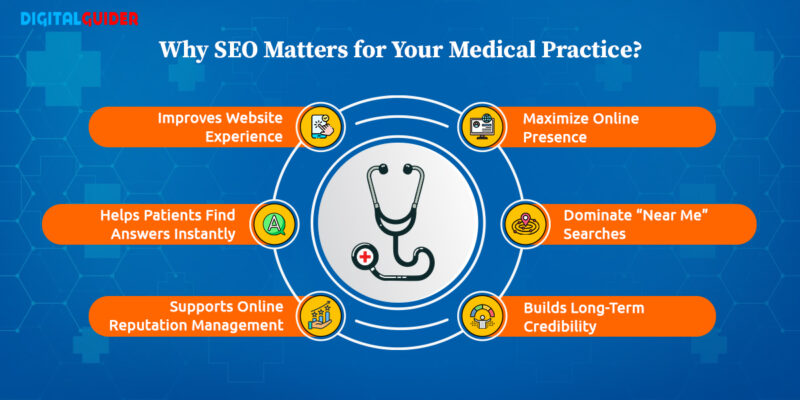
🔽 Here’s why SEO for doctors is essential for your overall healthcare SEO performance:
The Higher You Rank, the More Patients You Attract
According to a Forbes study, 75% of users never scroll past the first page of search results.
And the top 3 results? They attract the bulk of user clicks.
If your doctor profile or website isn’t ranking among those top spots, chances are you’re losing potential patients to competitors, even if your services are excellent. An effective SEO strategy for doctors ensures your services get the visibility they deserve.
Turn “Doctor Near Me” Searches into Real Walk-ins
In the healthcare industry, people are usually searching for providers nearby.
Whether it’s “nephrologist near me” or “dermatologist in Austin,” most patients are looking for someone local, trusted, and available fast. And Google knows this—its algorithm prioritizes location-based results, especially in healthcare.
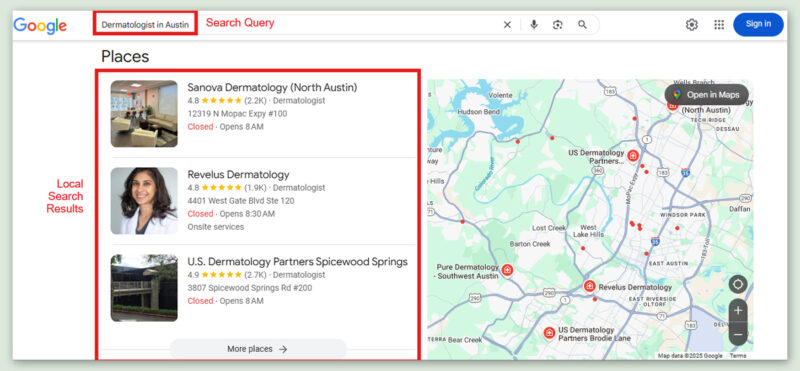
That’s where local SEO for doctors makes a real difference. With the right healthcare SEO strategy, your practice can show up in Google Maps, voice searches, and “near me” results—right when patients are ready to book, call, or walk in.
Patients Trust Who They See First
Ranking high on Google doesn’t just drive visibility to your healthcare website; it builds trust before patients even land on your site.
In healthcare, trust is non-negotiable. And when your site appears at the top of search results, patients are more likely to see you as credible, even before they visit your website or call your clinic.
✔️ That’s why it’s a fact that SEO services for healthcare providers don’t just help you get found—it helps you get chosen.
Your Website Is Your First Impression
Ever landed on a healthcare website that’s slow, messy, or hard to use?
Frustrating, right? Patients feel the same.
A poor website experience can turn them away in seconds. 👎🏼
That’s where good technical SEO for medical websites should be an essential part of your digital marketing strategies so that your website loads quickly, works smoothly on mobile, is secure, and is easy to navigate. In short, it helps your practice make an impactful first impression online.
Convert Curiosity into Consultation
Picture this: a well-optimized blog on “How to manage migraines naturally” brings a patient straight to your neurology clinic, without spending money on ads.
That’s not magic. This is possible via content marketing and blog optimization. By anticipating patient queries and offering helpful answers through your blog, you not only attract visitors, you educate them with valuable, reliable information.
This is how complete Healthcare SEO marketing turns traffic into trust—and trust into bookings. 🚀
Patients Read Reviews Before They Book
🔍 Did you know? Three out of four patients start with reviews when searching for a new doctor or clinic.
That means SEO for clinics isn’t just important for boosting your online reputation—it’s essential.
From SEO to patient perception, reviews, star ratings, and testimonials all show that your healthcare services are trustworthy and worth considering.
While SEO is essential for every industry, healthcare follows its own rules.
👇🏼 Let’s take a quick look at how SEO for Doctors differs from general SEO.
With the right SEO agency for doctors, your healthcare practice can rise above the noise, meet patients where they are, & turn searchers into loyal patients.
Proven SEO Strategies for Doctors That Attract Patients
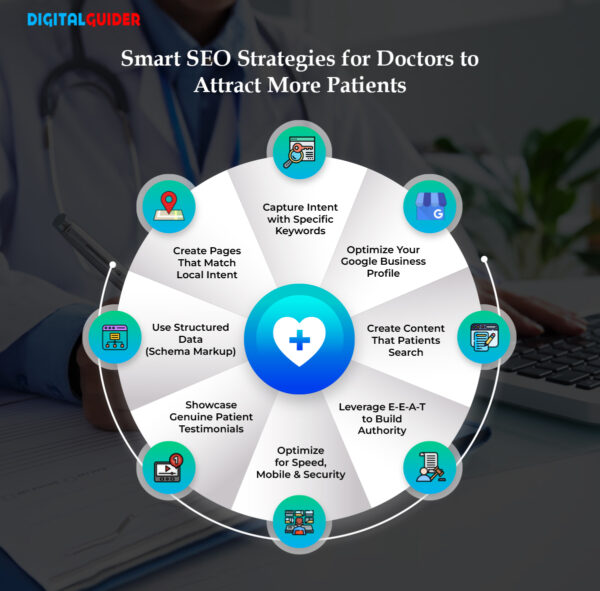
Find Out What Patients Are Googling
Searches by patients are never too generic, like “doctor” or “clinic.” They are typing something far more precise, like “natural remedies for sinus infection.”
That’s why it’s important to find the exact phrases patients use and their intent—informational, navigational, or transactional. It helps in aligning your content with their needs. Ultimately, this indicates relevance to Google and boosts your visibility on search engines with the right SEO for medical clinics.
| 📌 Pro Tips ✅ Create keyword groups based on patient concerns like symptoms, conditions, or treatments (e.g., “skin rash treatment at home,” “eczema specialist in Houston”).✅ Use tools like Google Autocomplete, AnswerThePublic, or Ubersuggest to find real patient queries. |
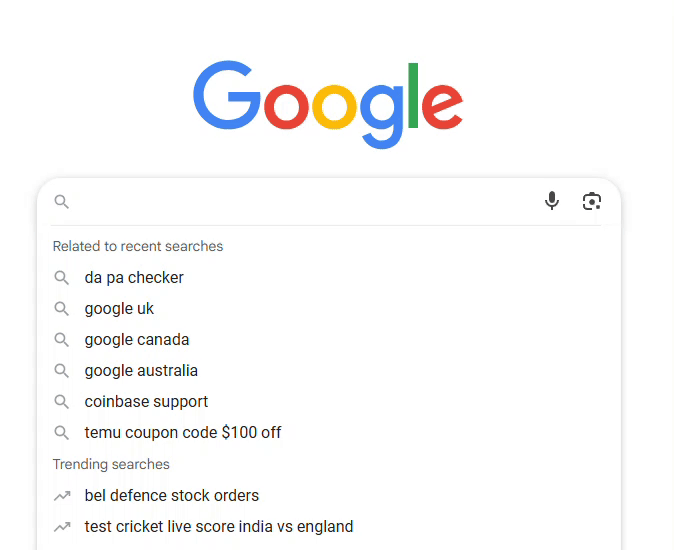
Build Pages That Match Patient Searches
For effective SEO for medical clinics, location matters. Patients often search using terms like “near me” or “dermatologist in Texas,” so your website must reflect a strong local focus.
If your clinic serves multiple cities, Franchise SEO is key. Don’t just list locations—create fully optimized pages for each one with local keywords, unique content, and consistent business info to boost visibility in every area you serve.
| 📌 Pro Tip ✅ Add hyper-local content like nearby landmarks, events, or health concerns specific to that area to boost trust and local relevance. |
Create Content That Answers Real Queries
Patients aren’t just booking appointments—they’re looking for valuable solutions to their questions, concerns, and interests related to health conditions, treatments, and prevention.
Here, your website should serve as a trusted resource, not just a brochure. Create clear and easy-to-understand content like blogs, FAQs, and guides that simplify medical topics.
This is the backbone of medical SEO services and a key deliverable of any good healthcare digital marketing strategy.
💭 Think “how-to” and “what to expect” articles (such as “What Causes Frequent Headaches in Teenagers?” or “How to Improve Sleep Without Medication”) to meet real concerns.
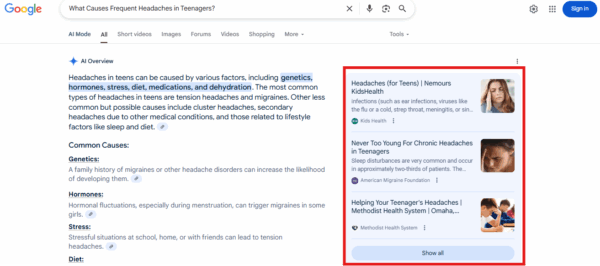
| 📌 Pro Tip ✅ Use “People Also Ask” on Google to discover real questions to turn into blogs. |
Show Authority & Trust
In healthcare, trust is everything. Google prioritizes websites that demonstrate strong E-E-A-T, which means your content is credible, reliable, and created by qualified professionals.
Effective SEO services for doctors begin with showcasing credentials, specialties, awards, certifications, and years of experience. To build trust and stay relevant, regularly update medical content with the latest treatments and guidelines.
| 📌 Pro Tip ✅ Link to trusted medical sources to support credibility and strengthen E-E-A-T. |
Use Structured Data (Schema Markup)
If you are implementing structured data on your healthcare website, that means you are helping search engines understand your content and making it eligible for rich snippets (such as star ratings, FAQs, and doctor info).
Use this specific code to improve your Healthcare SEO marketing performance and ensure your practice info, patient reviews, and services appear more prominently in local search results.
| 📌 Pro Tip ✅ Use Google’s Rich Results Test to check if your schema is implemented properly. |
Patients Hate a Slow or Unsecure Site
A fast, mobile-friendly, and secure healthcare website provides a positive user experience, which Google rewards with higher rankings. Moreover, it also builds patient trust.
To provide a smooth user experience:
- Invest in a responsive website design that automatically fits any screen size.
- Ensure your website has an SSL certificate—a must for security and SEO for medical websites.
- Use Google PageSpeed Insights to test your site.
| 📌 Pro Tip ✅ Use compressed images and avoid bulky plugins to speed things up. |
Optimize Your GMB to Get Found Faster
Your Google Business Profile is like your digital front door; it is the first impression a patient gets of your practice. For local SEO for doctors, your GBP often appears before your website in search results.
So, it’s crucial to keep your practice information accurate and regularly updated with all essential details.
| 📌 Pro Tips ✅ Beyond just your address and phone number, add high-quality photos of your clinic, accurate timings, and even a virtual tour if possible. ✅ Always respond to every review, positive or negative. |
Build Trust with Real Stories
Word-of-mouth is powerful, and online reviews are its modern equivalent. Real testimonials speak louder than any pitch—building credibility and trust.
That’s why it is important to collect and prominently display positive feedback from your patients on your website and Google Business Profile.
- Add written reviews, testimonials, and star ratings to key pages to strengthen trust and boost doctors SEO.
- In fact, it is better to display them near service CTAs like “Book Appointment” or “Get a Second Opinion.”
This adds value to your SEO for healthcare providers’ performance.
| 📌 Pro Tips ✅ Make it convenient for patients to leave reviews by providing direct links or QR codes. ✅ Respond properly to all reviews, positive or negative. ✅ Consider video testimonials if patients are comfortable, as they are incredibly impactful. ✅ Add a “Success Stories” page for better engagement using long-tail queries like “how I cured my heel pain.” |
Blogging for Doctors: Is It Necessary?
It doesn’t matter what your specialty is—blogging is one of the most effective ways to drive organic traffic, answer patient questions, and build trust before someone ever picks up the phone to call your clinic.
Search engines favor helpful content that addresses real concerns. When you publish blogs that answer common health queries, your website becomes a go-to resource for patients.
| ➕Bonus A well-written blog post can rank for multiple keywords, appear in featured snippets, and even get shared in health forums or social media. Sample Blog Titles
|
Every blog you publish is a new opportunity for a patient to find you, right when they need help the most.
SEO Scorecard: What Should Doctors Track for Real Results?
You’ve optimized your website—great.
But how do you know it’s working? 🤔
To truly measure the success of your SEO for doctors strategies, you should track the metrics that reflect visibility and patient action. It’s not just about traffic—it’s about the right kind of traffic.
Key Metrics to Watch:
✅ Keyword Rankings – Check if you are showing up for terms like “pediatrician near me” or “dermatologist in [your city].”
✅ Local Search Traffic – Track how many visitors come from your local areas.
✅ Calls & Appointment Form Submissions – Are more patients reaching out from Google searches?
✅ Google Reviews & Map Views – Your good online reputation and visibility for your local customers go hand-in-hand.
SEO Tools:
✅ Google Analytics – Understand where your traffic comes from and what users do on your site (specific actions by users).
✅ Google Search Console – Monitor keyword performance, website errors, and click-through rates.
✅ Google Business Profile (GBP) Insights – See how many people found you via local search, clicked to call, or requested directions.
Tracking these helps you tweak what’s working and fix what’s not. So that every strategy of your SEO for clinics brings you closer to more appointments and better online visibility.
Real SEO Results Behind a Doctor’s Local Reach |
Dr. Amanda Reynolds runs a small but well-reviewed family medicine clinic in Austin, TX.
Despite strong offline referrals, her online visibility was weak. Most new patient leads came via Zocdoc or insurance directories, not her own website.
What Challenges Amanda Faced
❌ Outdated website with minimal content
❌ Poor mobile experience for patients
❌ Inconsistent NAP details across online listings
❌ Not ranking for “Near Me” searches
❌ Few patient reviews on Google
How Did We Help?
☑️ Improved local keyword targeting with terms like “family doctor Austin TX” & “primary care near me”.
☑️ Enhanced website structure with a mobile-friendly framework.
☑️ Optimized GMB with updated hours, services, photos, and appointment links.
☑️ Encouraged online reviews from satisfied patients.
☑️ Earned quality backlinks on healthcare-related websites and directories.
Results After 5 Months
- Organic Traffic: 220 -> 1,180/month
- Top 3 Local Pack Rankings: 0 -> 5
- Page 1 Keywords: 2 -> 14
- Google Reviews: 11 -> 73 (4.9 stars)
- Website Leads: ~6/month -> ~1922/month
Doctor’s Feedback
“For the first time, we are getting patients from our own website, not just insurance networks. The growth has been steady and organic. I now understand how powerful SEO can be for independent practices.”
TL;DR: Turn Searches into Scheduled Visits
That’s why it’s absolutely true—
👉 SEO services for doctors are the foundation of your clinic’s digital growth.
If your potential patients are turning to Google for everything—from symptoms and solutions to specialists and nearby clinics—then a reliable seo company for doctors is the power move your practice needs. It ensures every local listing is optimized, every blog or service page builds trust, and every search brings patients one step closer to your clinic’s door.
Want to start converting traffic into real appointments?
Let’s build a strategy tailored to your practice—Book a Free Consultation Today!
FAQs
Q. Does SEO for doctor work for small clinics too?
Absolutely. Local SEO for clinics helps small practices appear in “near me” searches and Google Maps.
Q. Do doctors need SEO if they get referrals?
Yes, patients often Google doctors after being referred to check reviews and services.
Q. Is blogging necessary for overall SEO?
It’s highly recommended. Blogs help answer common patient questions and improve ranking, a key part of medical SEO services.
Q. Do video testimonials help with SEO for doctors?
Yes—especially when optimized with keywords, captions, and schema.
Q. Can SEO help my practice appear in voice search results?
Yes. Use natural, conversational phrases and FAQs to boost voice search visibility—this is included in most modern healthcare SEO services.
Q. Is it better to have separate pages for each service?
Yes—individual service pages help target specific keywords and rank better.
Q. Is HTTPS important for healthcare websites?
Absolutely. Secure websites rank better and protect sensitive patient info.
Q. What’s the biggest SEO mistake healthcare websites make?
Using duplicate or generic content—Google penalizes both and patients find them unhelpful. A strong healthcare marketing SEO strategy avoids this.







